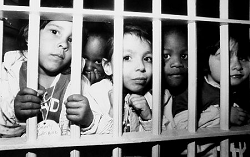February 2013
- Posting by PRAWA
- News

 Wyoming Governor Matt Mead today signed House Bill 23 into law, which abolishes sentences of life in prison without parole for children in that state.
Wyoming Governor Matt Mead today signed House Bill 23 into law, which abolishes sentences of life in prison without parole for children in that state.
PRAWA joins the Campaign for the Fair Sentencing of Youth to applaud Governor Mead for his action on this issue, which means Wyoming will no longer sentence people to die in prison for crimes that were committed when they were younger than 18.
Under Wyoming’s new law, which will be effective on July 1, children in the state who are convicted of first degree murder will be eligible for parole or can have their sentences commuted to a term of years.
By passing this new law, Wyoming takes a step forward in demonstrating that our society can hold young people accountable for serious crimes without discarding them for the rest of their lives. This bill is the step in the right direction in recognizing that children are categorically different from adults, and must be treated accordingly when sentenced.
In 2005, the Supreme Court prohibited the death penalty for children younger than 18, acknowledging that youthfulness is an important factor in determining whether a punishment is cruel and unusual. Then in 2010, the Supreme Court struck down the practice of sentencing children to life in prison without parole when their crimes did not result in a death. And in June 2012, the Court ruled in Miller v. Alabama that mandatory sentences of life without the possibility of parole for children are unconstitutional.
Everyone is better than their worst act, particularly children. We encourage policymakers throughout the country who are working to implement the Miller v. Alabama decision to think holistically about how their state can hold young people accountable in a manner that reflects their unique ability to change and focuses on rehabilitation and reintegration into society.
“The susceptibility of juveniles to immature and irresponsible behavior means ‘their irresponsible conduct is not as morally reprehensible as that of an adult.’ Their own vulnerability and comparative lack of control over their immediate surroundings mean juveniles have a greater claim than adults to be forgiven for failing to escape negative influences in their whole environment… From a moral standpoint it would be misguided to equate the failings of a minor with those of an adult, for a greater possibility exists that a minor’s character deficiencies will be reformed.”
U.S. Supreme Court, Roper v. Simmons (2005)
It will be recalled that the mission of PRAWA is to promote institutional reforms in formal and informal sector for access to justice, rehabilitation, and social development of prisoners, ex-prisoners, torture victim and youth at risk.
